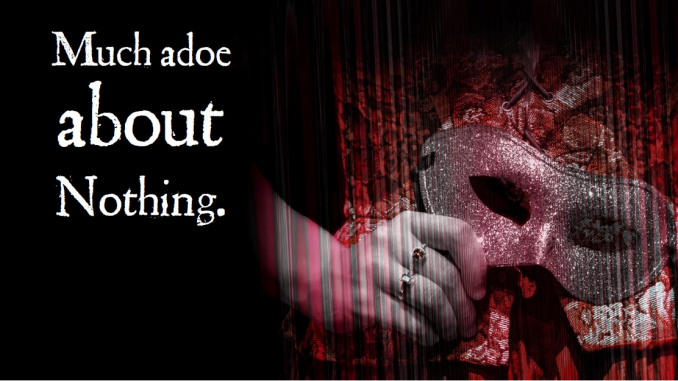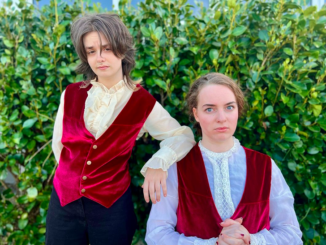
[There’s a double meaning in that!]

More Shakespearean productions should do what the team behind Much Adoe do. To wit: the female roles are cast with male actors, the male roles are cast with female actors. We have the experience of watching the men take on Beatrice and Hero, roles written not for women, but for the ‘boy actors’ of the early modern stage. Beatrice’s “O that I were a man!” speech piles on the ironies and resonates differently when played by a man. Beatrice is a prized role and once again, irony of ironies, the dude get the best part in the play! On the other hand, the second-female lead, Hero, is notoriously underwritten, a blank, and the other ‘female’ roles little more than bit parts. The casting means that there are a wide range of challenging parts for the female actors, such as the cocky Benedick, love-sick Claudio, scheming Don John and the diligent Dogberry, that they would not conventionally get considered for. Director Rita Stone’s casting strategy means we get the best of both worlds.
It’s a great choice for Much Adoe about Nothing, in which gender politics drives the drama. “Nothing”, we like to shock the Shakespeare students at university, is Elizabethan slang for a vagina. The marriage between would-be lovers Hero and Claudio is sealed as a business transaction, Hero a prop and prize in her father Leonato’s estate. Meanwhile, the very single Benedick and Beatrice vehemently resist the social and gendered expectations of marriage, until finally admitting their mutual attraction. Much Adoe is a play about who likes who, and who is pretending not to. It’s a play about playing, and what better way than sending up the constructed roles that we all play?
War is over, and the soldiers have returned to the domestic sphere. There’s a face-off between the women and older men left behind and the returning war party, soft fabrics versus the darker-edged garments of the men, who clutch their swords tightly. But they are soon mingling, except for Beatrice (Murdoch Keane) and Benedick (Courtney Bassett) who circle each other with taunts and put-downs. Keane plays Beatrice with a feline-fierceness, playing with her prey like a lion would a mouse. But there’s a fear to the performance as well, a refusal to drop her guard lest she show her weakness, such is the way she must survive as an unmarried, fatherless woman in a society controlled by men. It’s an intelligent and very watchable interpretation by Keane.
Claudio (Crystelle L’Amie) has returned with thoughts of Hero (Keirron Diaz-Campbell), the only daughter of Leonato (Irene Corbett), on his mind. L’Amie makes the risky choice of playing Claudio with a speech impediment, which matches the character’s ineloquence, but the stutter doesn’t yet sit in her body. Stone could also reduce the instances Benedick uses the stutter to tease and mock Claudio so this can have more impact.
L’Amie’s Claudio is a very callow, awkward youth. At the beginning of the play I don’t buy that this Claudio could have done any good on a battlefield, but this also says something about perceived notions of masculinity and violence. I am however convinced towards the end of the play when, through a series of suitably Shakespearean plot machinations, Claudio turns against Hero and indicts the entire female gender with an ugly forcefulness.
Courtney Bassett plays Benedick with an extreme casualness, which we understand as Benedick’s way of keeping composure when underneath he is madly making up everything as he goes. Thank goodness his mates decide to trick him into thinking Beatrice is into him, otherwise you get the impression he’d soon get bored and go back to the battlefield on a one-man crusade just for something to do. He proudly speaks of his desire to “live a bachelor”, and reacts with a confused vulnerability to Claudio’s wish to “turn husband”. Bassett’s Benedick is touching in his support of his friend while uncertain of what this means for their friendship. It’s the end of the golden bromance, and Benedick doesn’t know what to do. Later, Bassett’s discombobulation when Benedick learns of Beatrice’s affections is brilliant, and the delight in Beatrice’s “double meaning” after a terse invitation to dinner is a joyous moment for both us and the character.
The doubled scenes where Beatrice and Benedick hide and overhear their friends talking about their love interest’s interest in *them* is a chance for directors and casts of this play to flex their comic abilities. The first scene with the men and Benedick is overplayed as Bassett scarpers round the stage in search of hiding spots. The other men start too big and broad, especially L’aime’s ‘bad acting’ schtick – it needs to grow as the gossipers gain in confidence and enthusiasm. For the Beatrice scene they make the smart choice to give the character no cover so Keane is forced to come up with hilariously inventive ways to hide in plain sight.
Irene Corbett’s Leonato is a very groovy Dad until Hero is publically accused of being unfaithful to Claudio. Corbett draws out the conflict as to whether the Leonato’s social standing or loyalty to his daughter will win out. Kierron Diaz-Campbell’s Hero is less wide-eyed than the text might suggest, and her choice of Claudio seems to be more about pragmatism than how smitten she is. Kelly Harris’s “plain dealing villain” Don John luxuriantly broods: if he can’t be happy, neither should anyone else. Though it is apparent the cast have put much work into the physicality of the characters, most of the cast only very lightly re-gender their voices, which gives for a strong and clear reading of the dialogue. The exception is Sora Lee, who goes for the Monty Python school of funny female voices, a parody that clashes badly with the general approach.
Throughout the production process director Rita Stone has led an “original practises” approach to the play. This means TAPAC has been designed to approximate an indoor Jacobean theatre, which even includes a panel overhead depicting the sun, stars, and angels, in contrast to the vary bare stage below, to give a sense of the ornate decoration of such spaces. There are no lighting changes. Hanging chandeliers with fake candles cast a dim pallor over the stage. Chantelle Gerrard’s gorgeous costume designs give us a sense of Elizabethan fashions, and especially the way that social standing and gender is weaved into the garments. In rehearsals, the cast have worked from a cue script which gives only their lines and the cue just before. This appears to have helped the alert stage presence of the cast who listen well to each other, but there are a number of line stumbles, which should hopefully course-correct.
So it’s a very clear, no frills approach to the text, that is until in walks the constable Dogberry and side-kick Verges. Harriet Maire (who plays Beatrice in Nothing Much to Do, the very good web series based on the play) shines as an improvising Dogberry, commenting in contemporary speech upon the action, the audience, and whether the stage manager (the ever professional Jordan Keyzer) has put enough safety-tape around the stage. The arrival of Dogberry renews the energy of the play – you can anticipate that once the crew get to the Globe, this will be just the kick that the standing groundlings will need to get them through to the end.
The TAPAC production plays this week only, and then come February the cast get only one day and two performances at the Pop-up Globe. The organisers should consider some extra performances. This production of Much Adoe is a clever examination of social roles performed by a committed young cast.
Much Adoe About Nothing is presented by the Young Auckland Shakespeare Company and plays at TAPAC until 30th January, and then the Pop-Up Globe on 21st February. Details see TAPAC and Pop-Up Globe.




Leave a Reply